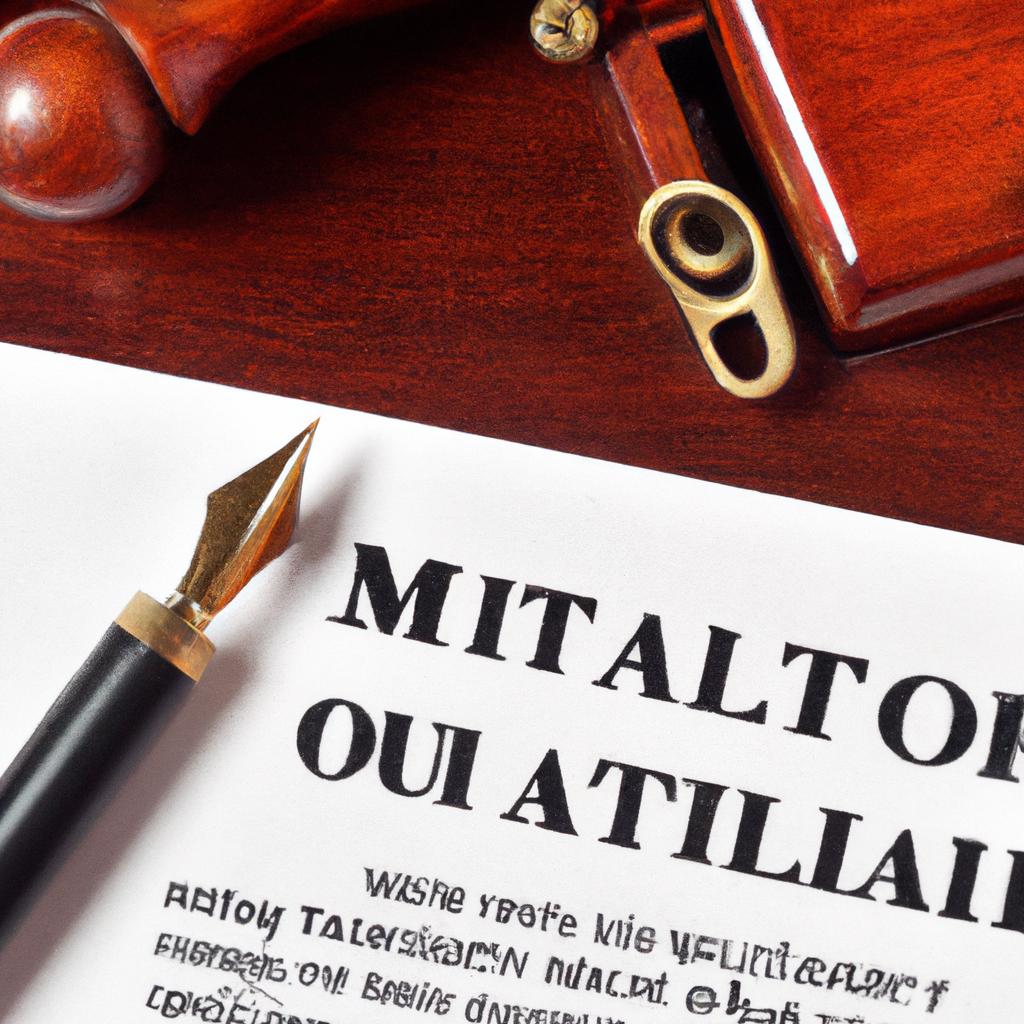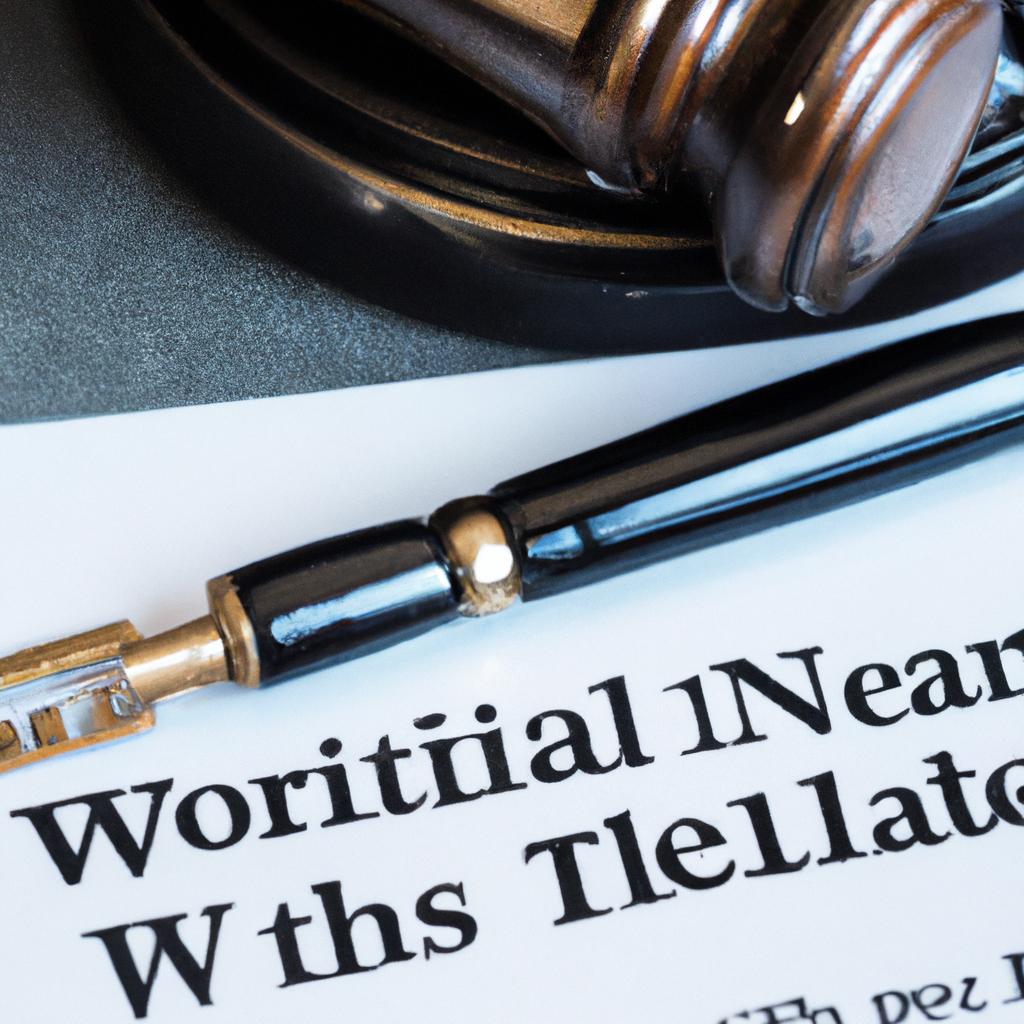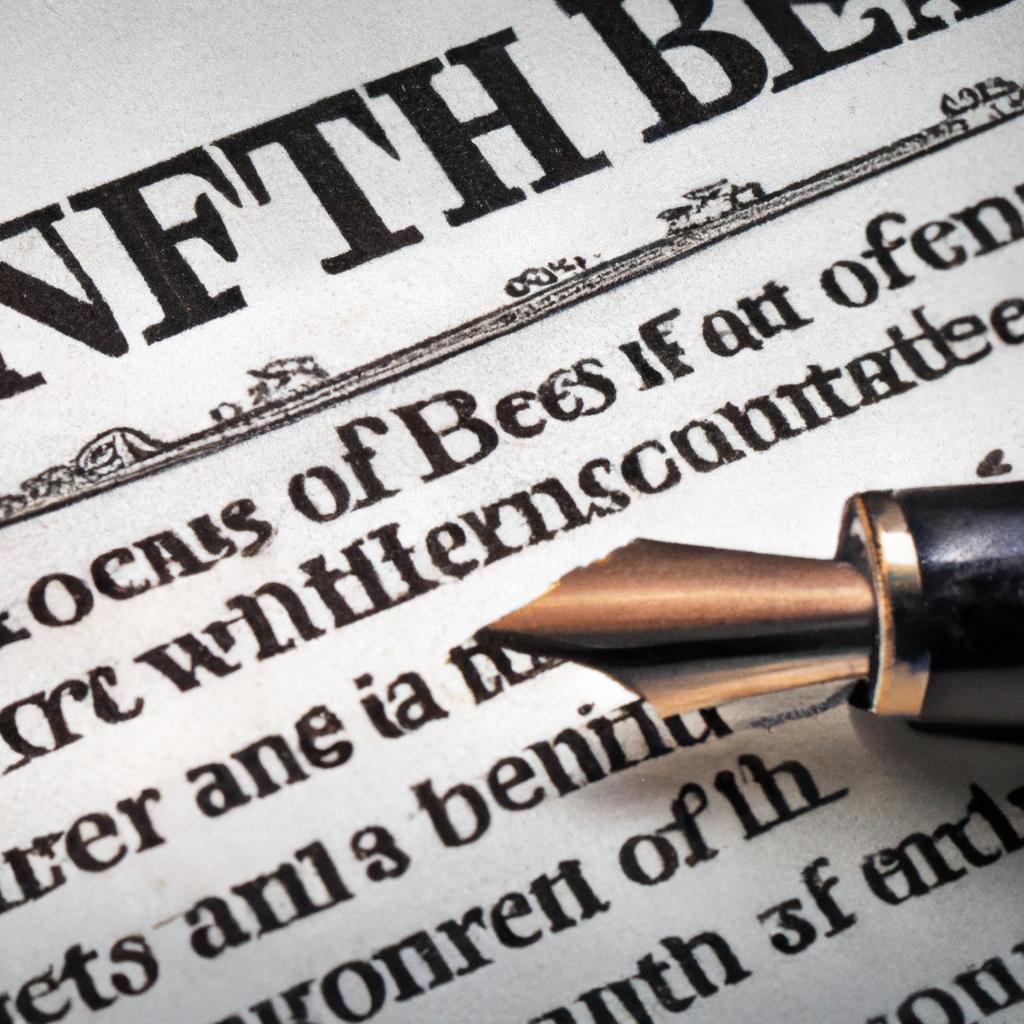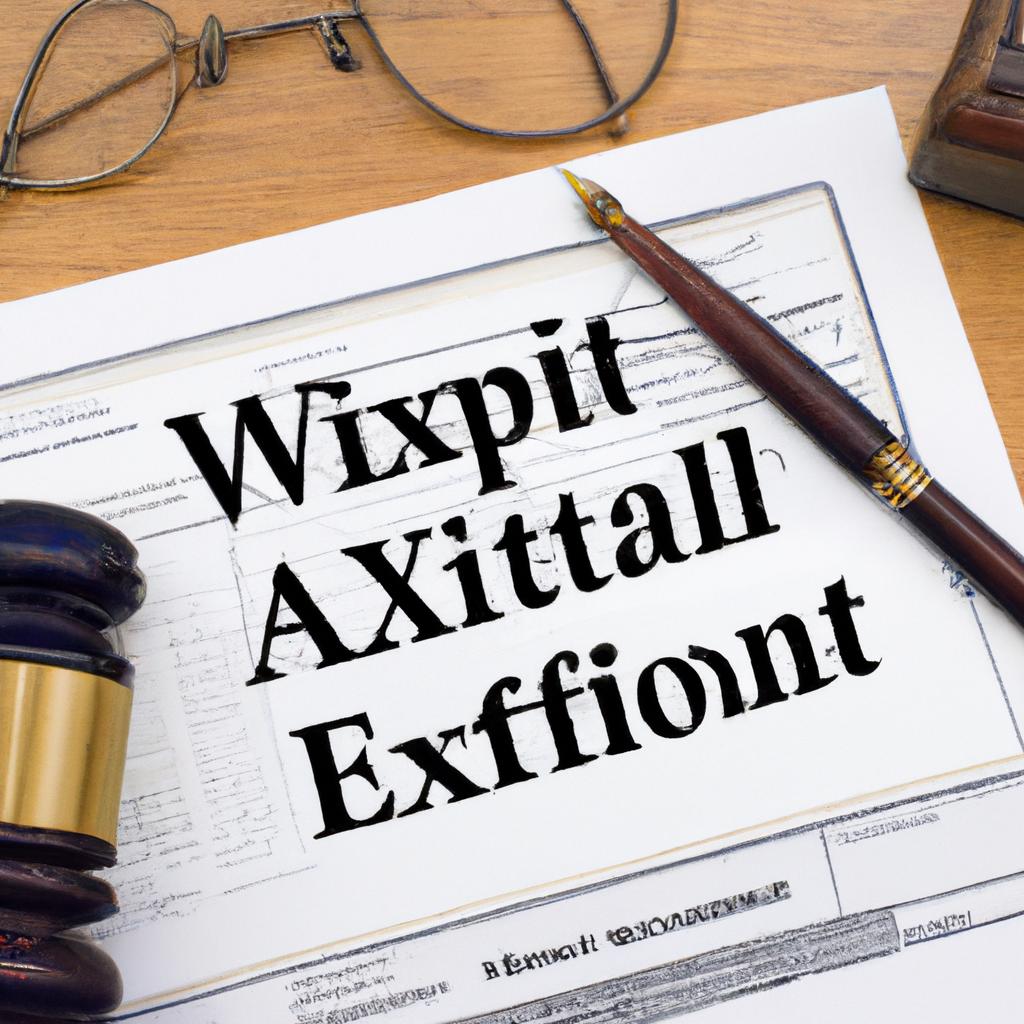In the realm of estate planning, the question of whether or not to notarize a will is a common query among individuals seeking to secure their legacy. As seasoned legal professionals at Morgan Legal Group in New York City, we understand the importance of ensuring that your final wishes are carried out smoothly and efficiently. In this article, we delve into the intricacies of will notarization and highlight the implications it may have on the probate process. Join us as we dissect this crucial aspect of estate planning to provide you with the clarity and guidance necessary to make informed decisions about your legacy.
Determining the Necessity of Notarizing Your Will
One of the key considerations when creating a will is whether or not it needs to be notarized. While notarizing a will is not always a requirement, it can provide an added layer of protection and validity to the document. Notarization involves having a notary public witness the signing of the will and verify the identities of the parties involved. This ensures that the will is authentic and free from any coercion or fraud.
Having your will notarized can help prevent disputes and challenges to its validity after your passing. It also provides peace of mind knowing that your wishes will be carried out as intended. In addition, notarizing your will can simplify the probate process for your loved ones, as it provides clear evidence of your intentions and can help expedite the distribution of your assets. If you are unsure whether or not to notarize your will, it is best to consult with an experienced estate planning attorney to determine the best course of action for your specific situation.

Key Considerations for Notarizing a Will in New York
Understanding the legal requirements for notarizing a will in New York is crucial to ensure its validity and effectiveness.
When notarizing a will in New York, there are several key considerations to keep in mind:
- Ensure the testator is of sound mind and is signing the will voluntarily.
- Choose a qualified notary public who is authorized to notarize legal documents in New York.
- Follow the proper procedure for signing and witnessing the will in the presence of the notary public.
Additionally, it is important to be aware of any specific requirements outlined in New York state law:
- Make sure the notary public includes their official seal and signature on the will.
- Verify that all parties involved in the notarization process, including witnesses, comply with state regulations.
- Consider seeking legal advice from an experienced estate planning attorney to ensure all necessary steps are followed correctly.

Understanding the Benefits of Having a Notarized Will
Having a notarized will is essential to ensure that your final wishes are carried out smoothly and accurately. Notarizing your will adds an extra layer of authenticity and helps prevent any challenges to the validity of the document. By having a notary public witness the signing of your will, you can rest assured that it meets all legal requirements and is less likely to be contested in court.
Additionally, a notarized will can help streamline the probate process and make it easier for your loved ones to access and distribute your assets. It provides a clear and indisputable record of your intentions, reducing the likelihood of confusion or disputes among beneficiaries. Ultimately, having a notarized will can offer you and your family peace of mind knowing that your estate will be handled according to your wishes.

Expert Recommendations for Properly Notarizing Your Will
The proper notarization of your will is a crucial step in ensuring its validity and enforceability. Our team of legal experts at Morgan Legal Group in New York City recommends following these expert recommendations to properly notarize your will:
1. Choose a Qualified Notary Public: When notarizing your will, it is important to select a qualified notary public who is authorized to perform notarial acts. Ensure that the notary public is impartial and has no personal interest in the contents of your will.
- Notary Public Name: John Smith
- Notary Public License Number: NY123456
2. Sign Your Will in the Presence of the Notary: To properly notarize your will, you must sign it in the presence of the notary public. The notary will then verify your identity, witness your signature, and affix their official seal to the document.
Q&A
Q: Do I need to notarize my will?
A: Not necessarily, but it is highly recommended.
The Conclusion
So, as you consider the importance of ensuring your will is legally valid and properly executed, remember the option of notarizing your will. While not always required, notarizing can provide an added layer of protection and credibility to your final wishes. Ultimately, the decision to notarize your will is up to you and your unique circumstances. Consult with legal professionals to determine the best course of action for your estate planning needs. Remember, it’s never too early to start planning for the future.
 Do I Need to Notarize My Will? A Comprehensive Guide for Estate Planning Needs
Do I Need to Notarize My Will? A Comprehensive Guide for Estate Planning Needs
Estate planning is a crucial aspect of our lives that often gets overlooked. The process of determining how our possessions and estate will be distributed after our passing is an important decision that should not be taken lightly. One important aspect of estate planning is creating a will. A will is a legal document that specifies how your assets will be distributed when you pass away. However, many people are unsure about whether they need to notarize their will or not. In this article, we will explore the purpose of notarization, the benefits and practical tips of notarizing your will, and other considerations for estate planning.
What is Notarization?
Notarization is the process of having a licensed notary public verify the authenticity of a signature on a legal document. A notary public is a state-appointed official who is authorized to witness and attest to legal documents. They also serve as an impartial witness to prevent fraud and ensure that the document is being signed willingly and under no duress. Notarization is often required for important legal documents such as wills, trusts, and deeds.
Do All Wills Need to be Notarized?
The requirements for creating a valid will vary from state to state. Some states require wills to be notarized, while others do not. It is essential to understand the specific laws in your state to ensure that your will is legally binding. However, even if your state does not require notarization, it is still recommended to have your will notarized for added legal protection.
Benefits of Notarizing Your Will
1. Provides Proof of Authenticity
Notarization provides an added layer of assurance that the will is authentic, reducing the chances of it being challenged in court. The notary public verifies the identity of the person signing the document and witnesses the signing. This helps to prevent cases of fraud or coercion, giving more credibility to the will.
2. Helps with the Probate Process
The probate process is the legal procedure for validating a will and distributing the assets of a deceased individual. Notarized wills can streamline the probate process and make it easier for the court to determine its authenticity. This can save valuable time and money for your loved ones when it comes to executing your final wishes.
3. Avoids Improper Execution Claim
A will that has not been properly executed may be deemed invalid in court. Notarizing your will ensures that all the necessary steps have been taken to make it legally binding, reducing the risk of it being questioned in court.
4. Offers Peace of Mind
Notarizing your will provides peace of mind and reassurance that your final wishes will be carried out as intended. It also reduces the chances of disputes between family members after your passing. By obtaining notarization, you can rest assured that your will is legally binding and will be executed according to your instructions.
Practical Tips for Notarizing Your Will
1. Understand Your State’s Laws on Notarization
As mentioned earlier, the requirements for notarizing a will vary from state to state. It is crucial to understand the specific laws in your state to ensure that your will is legally valid.
2. Gather All Necessary Documents
Before visiting a notary public, ensure that you have all the required documents for the notarization process. This may include your government-issued ID, the original will, and any witnesses that may be needed.
3. Follow All Procedures Carefully
Notary publics are responsible for verifying the identity of the person signing the document, witnessing the signature, and completing the notarization process. Make sure to follow all procedures carefully to avoid any delays or complications.
4. Keep Your Will Safe and Secure
After notarizing your will, it is essential to keep it in a safe and secure place, such as a fireproof safe or a bank safety deposit box. This will ensure that your will is protected from damage or loss, and your final wishes can be carried out when the time comes.
Other Considerations for Estate Planning
Aside from notarizing your will, there are other important considerations for proper estate planning. These include:
1. Creating a Power of Attorney
A power of attorney is a legal document that gives someone else the authority to make decisions on your behalf in case you become incapacitated. This document is crucial for ensuring your financial and personal affairs are taken care of if you are unable to make decisions for yourself.
2. Establishing a Trust
A trust is a legal entity created to hold your assets and property for the benefit of one or more beneficiaries. It allows you to have more control over how your assets are managed and distributed after your passing.
3. Reviewing and Updating Your Estate Plan Regularly
It’s important to regularly review and update your estate plan, especially after any major life changes such as marriage, divorce, or the birth of a child. This will ensure that your plan reflects your current wishes and that it remains legally valid in your state.
In conclusion, notarizing your will is an essential step in estate planning that provides added legal protection and peace of mind. While not all states require wills to be notarized, it is still highly recommended to do so to avoid potential complications in the future. By following the practical tips and staying informed on your state’s laws, you can ensure that your final wishes are carried out and your loved ones are taken care of after your passing. Remember to review and update your estate plan regularly to ensure it reflects your current wishes. Planning ahead and taking the necessary steps now can save your loved ones from additional stress and uncertainty in the future.

